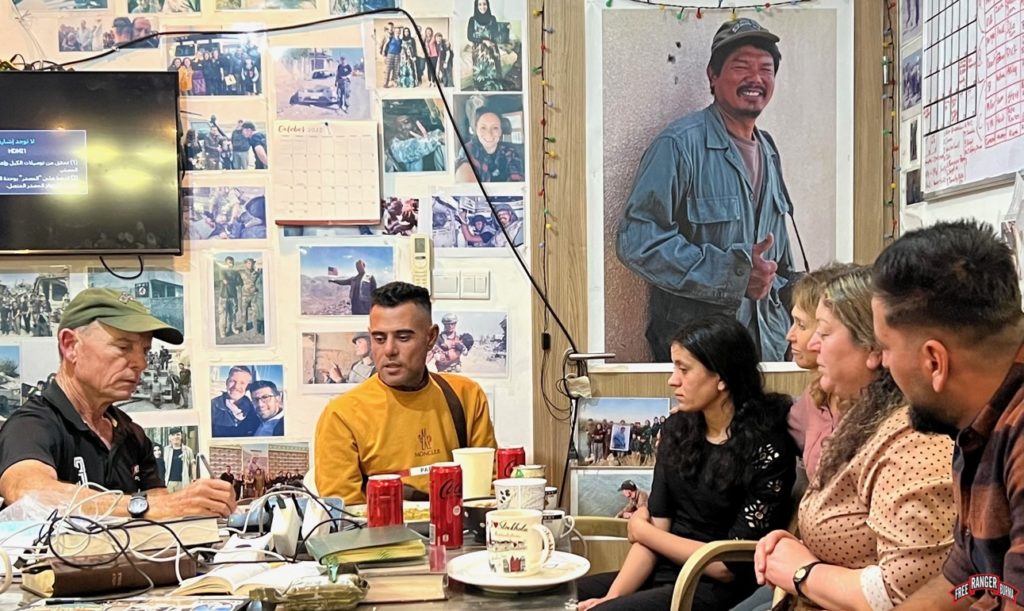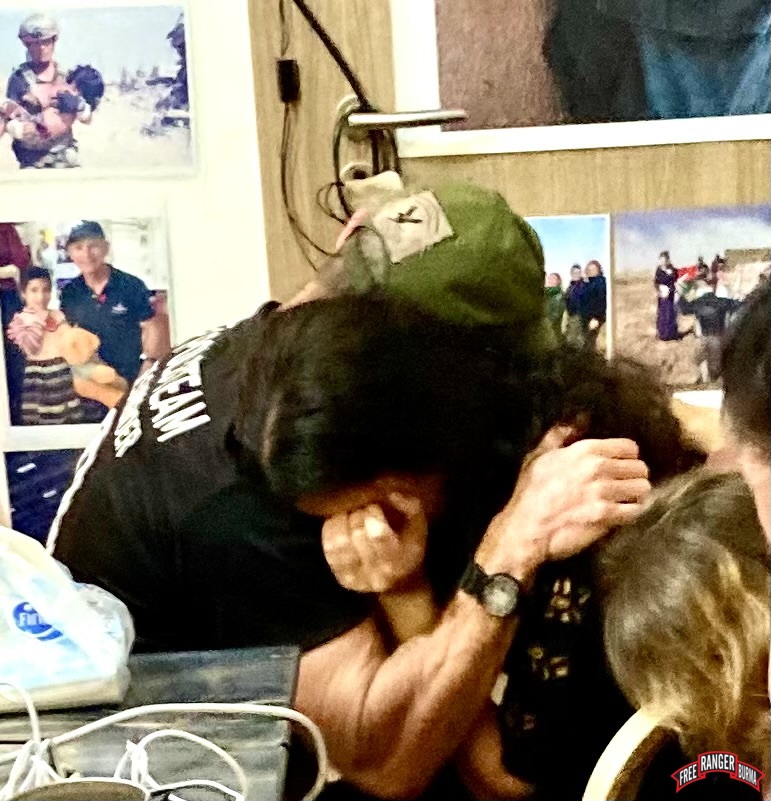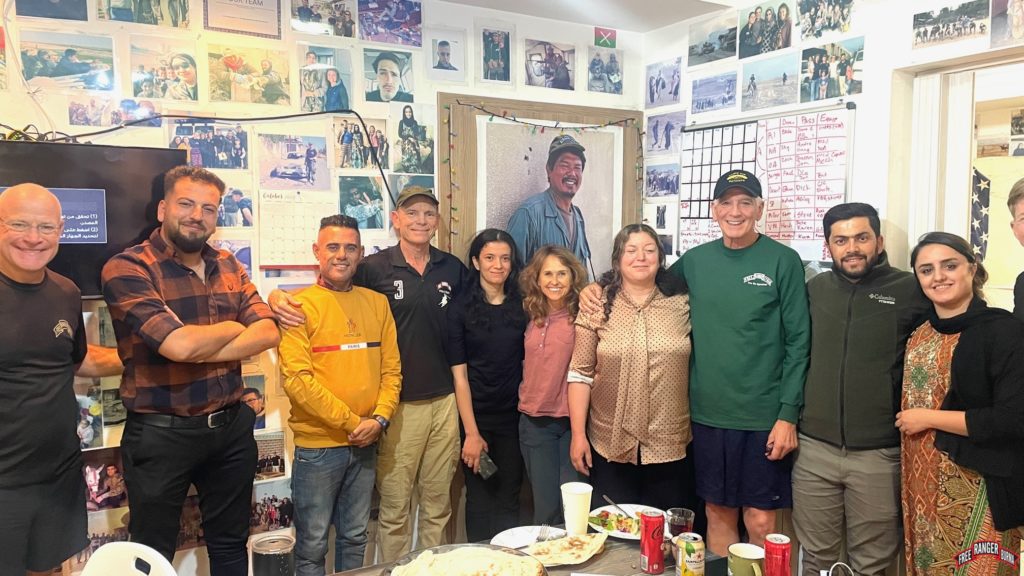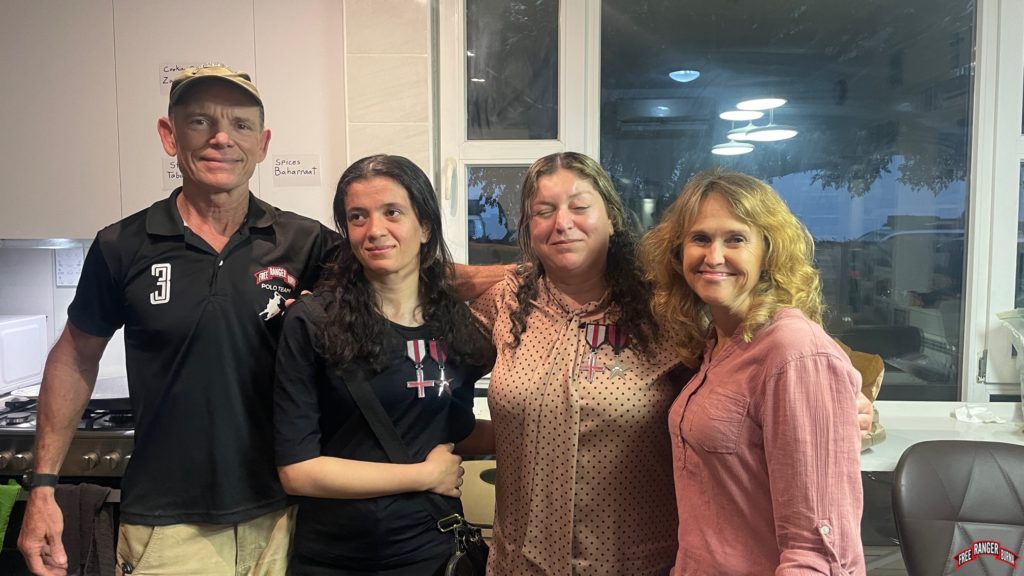Eight Years a Slave of ISIS – A Yazidi Girl’s Break for Freedom
20 December 2022
Iraq
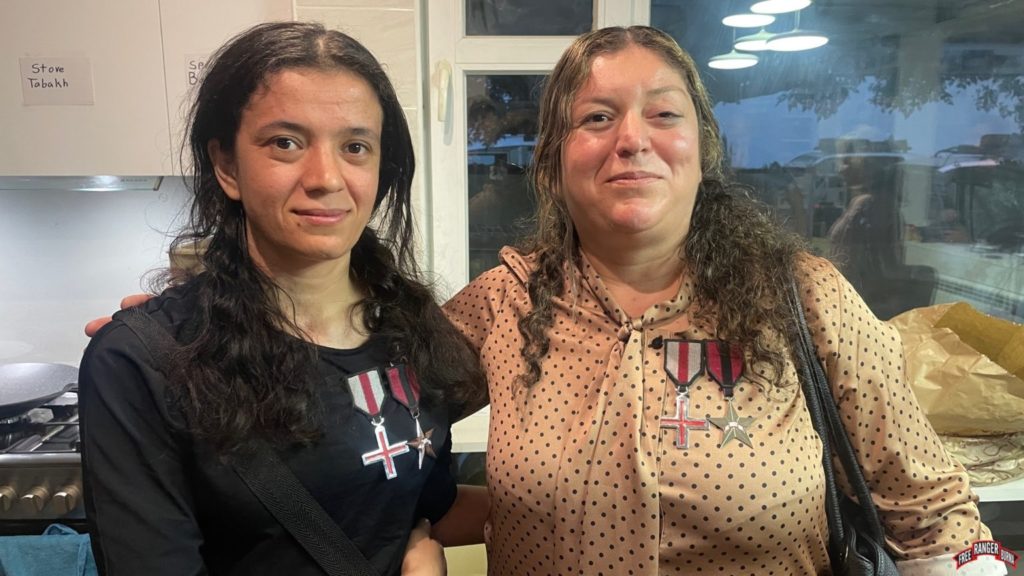
Sousan, a young Yazidi girl of 16, had one of the happiest days of her life when she was married to Fouzi, a Yazidi man, in the town of Sinjar, northern Kurdistan, Iraq. What she didn’t know was that five months after the wedding, in August 2014, ISIS would attack and take her town. This was after ISIS had already attacked and taken a large part of Iraq as well as Syria. The ISIS fighers swooped in with machine guns, tanks, and mortars, destroying all in front of them and targeting the Yazidi especially for brutal treatment. The Yazidis practice a Zoroastrian mix of religions that includes elements of Christianity and Islam that ISIS found especially abhorrent and so it was considered noble and good to kill Yazidi men and noble, good, and their right to take Yazidi women as their sex slaves.
When ISIS captured Yazidis they would corral them and separate men from women and then further separate the men from the boys. To distinguish between men and boys, they would lift up the arm and if there was armpit hair, meaning he was maturing, they would kill him, along with the fathers. If he didn’t have armpit hair, that meant he was young enough to brainwash. ISIS brainwashed thousands of these boys, forcing them to join ISIS as fighters. Many of them were forced to be suicide bombers and died at the wheel of a suicide vehicle plowing into unsuspecting Iraqi and Syrian villagers and soldiers. It was horrific.
Sousan and her family tried to escape the ISIS onslaught, but they were all captured and her father was taken away and is presumed executed; they have never seen him again. Her brother, who was 14 at the time, was also taken away and they’re not sure if he’s dead or alive. But her mother, herself, her four other sisters, and her infant youngest brother, were all captured together. Then they were separated from each other, daughters ripped away, screaming, from their mother, to be raped. Sousan was taken and immediately raped and beaten, separated from her mother with another sister who was eventually separated from her as well. Her mother and the three remaining sisters and son were taken and sold multiple times. The women were all raped, including her mother, and forced to be slaves for various ISIS fighters. Sousan was sold through different markets across western Iraq, and in the deserts of Anbar Province, till finally she was sold into Al Qa’im on the border of Syria and on into Raqqa, where she was sold at the Yazidi slave auction in the middle of the stadium of Raqqa, Syria. Raqqa was the capital of ISIS and it’s there where they planned to rule the world. It was in the stadium there that women were sold to the highest bidder and there are dungeons underneath the stadium that we visited after liberation that show the torture people underwent under ISIS. Sousan was one of these girls.
We were in Burma when ISIS launched that attack against the Yazidis in 2014 and we prayed for the people but we were in the middle of our own fight in Burma. By early 2015 we had been invited, and God opened up a way for us to help. One of the first places we went was Sinjar Mountain, overlooking the city held by ISIS. Just over 100,000 Yazidis had escaped and were hiding on the mountain. We went with our team and my family and slept in tents with the displaced people and did medical care, dental care, and Good Life Club programs; some of us went down to the front lines on the edge of the city to treat wounded Peshmerga, Kurdish soldiers. We became very close to the Yazidi community and very quickly met Fouzi and his family and learned about the fate of his wife. Twice she had been able to get her hands on a phone and call for help and twice Fouzi had answered and tried to send money in through human traffickers to try to buy her out of ISIS. We had also helped but none of these attempts worked.
She kept being sold to soldier after soldier. They would beat her, use her, get tired of her, sell her to the next person. She said there were people from all over the world who paid for her. There were Tunisians, Moroccans, Egyptians, French, Germans, Americans, Chechens, all kinds of people from so many countries she couldn’t remember, that came through and bought her and other Yazidi girls. She said, “There were thousands of us, but we were usually separated from each other.” She told us she wanted to die, but her memory of her family and her love for her mother and father and for her husband kept her alive.
We had begun to pray for her when we first heard her story. And we got to know Fouzi’s family: his father’s name was Faisal, and when ISIS was pushed out of Sinjar at the end of 2015, their family was the first to move back down to the ruined city, where they established a bakery and began to feed people. We became very close to Faisal and his family and Fouzi, his son, and the last time we were there, before the battle of Mosul, Faizal said, “You’ve given us so much help, that we want to give you something.” His wife gave Karen her silver wedding ring, and Faisal, the father-in-law of Sousan, gave me his wedding ring. I had lost my wedding ring many years ago and had no ring. And so now I wear this ring as a symbol of my marriage to Karen but also in honor of Faisal and his Yazidi family and of Sousan, who was still missing at that point.
That was 2016. By the end of 2016, ISIS was defeated in the Kurdish areas, including Sinjar, and the battle shifted to Mosul and we were invited to help the Iraqis, which we did. It was there that our Yazidi translator, Shaheen, died trying to save other Arabs. He, like Sousan, had suffered under ISIS, and knew many people who had been taken away, including women that he knew. And he hated ISIS, and by extension, he hated Arabs. But as we began to minister to the Arabs in the battle of Mosul and help the civilians and give medical treatment to the Iraqi soldiers, and talk about God’s love and talk about forgiveness, his heart began to change and the day he was shot, about four hours before, he turned to me, while we were rolling forward with bullets flying everywhere, and said, “David, you know what? I actually love these people. God has given me a love for these people. It feels so good. I want to help them. They are suffering too. They’re suffering under the same evil. I’m changing my heart – God is changing my heart.” And he smiled at me. It was only a few hours later, as we went to get a family that had been shot up, that he was killed trying to save this family.` Actually, he was shot trying to save this family and then died nine days later.
The battle of Mosul ended, ISIS was defeated in Mosul, and they still had the caliphate in parts of Iraq, but by the end of 2017, they’d lost any physical control over land in Iraq and all they had left was in Syria. By 2017, they’d lost almost everything in Syria as well and they had only a pocket along the Euphrates River, in Deir A Zor province. We started going back to Syria in 2018, and in 2019, the last stronghold of ISIS in Bagouz was where the most hardcore ISIS members had congregated to make their last stand. Among them were hundreds of Yazidi women who they drug in with them. One of them was Sousan. We were there, at the last big battle against ISIS, and watched the carnage unfold as, initially, there were 75,000 people in a small one-kilometer square valley, hemmed in on one side by hills on the east, and by the Euphrates on the west and the south. The northern gap was closed by the coalition of the Syrian Democratic Forces, Kurdish, Arab, Christian, and Yazidi forces. Many Yazidi women were able to flee but most stayed because ISIS put out propaganda saying things like: “If you escape, the Kurds are going to molest you and kill you and even if you get past the Kurds in Syria and go home no one is going to accept you any more because you’ve been part of us. They will execute you.”
Many Yazidi women believed that and we found that out because as the noose around Bagouz got tighter and tighter some people began to break out until finally thousands began to run away and these were all rounded up by the SDF. Among the women were Yazidis but they were very careful because if they came to us who were with the SDF, they might be executed or punished as ISIS. They were also afraid that if their escape wasn’t clean, they’d be killed by the actual ISIS people they’d fled with. They began to show themselves in ones and twos, and they said there were many more, but you couldn’t see them because they had the black covering and there were thousands of women. Some had kids and if they tried to break free they or their kids would be killed by the other ISIS women. So, step by step, bit by bit, person by person, the Kurdish forces and Syrian Democratic Forces were able to coax Yazidi women to break out of the ISIS group and be free. But still many ended up in Al Hawl, a refugee camp that held prisoner ISIS women and children. The men were taken to a different place.
This camp was like living hell; the Yazidi women were treated terribly and were threatened that if they ever tried to make any move of escape then their children would be killed by these other radical Islamist women, mostly from countries outside of the Middle East. There was over 52 countries represented in Al Hawl. At its height there were 70,000 people in that camp. All this time we’d been praying for Sousan to be set free and when we visited Al Hawl in 2019, we looked for any sign of her and had none. By now, her husband, Fouzi, had gotten word she’d been killed in an airstrike because she had endured many airstrikes as the SDF and Coalition closed the ring around ISIS in the different battles in Raqqa and along the Euphrates and finally at Bagouz. Thinking she was dead, Fouzi remarried, and soon had two children.
Then, in the middle of October 2022, Sousan said she finally summoned the courage and the next time she approached a guard of the SDF at Al Hawl, she said, “I am Yazidi, please help me.”
The female guard said, “Come with me,” and took her out of the camp. She had no children to be held hostage so it was easier for her. She said she was terrified at what would happen to her but she thought better to be killed by the SDF then to live a life of misery and be sold maybe again in the future and in the meantime beaten up by foreign ISIS women. Better to risk her life than to go back in prison with the ISIS women. She quickly found out the propaganda was not true and she was reunited back in Kurdistan, Iraq, with her mother. What she didn’t know was that when she had been separated and sold multiple times, one of the other sisters had managed to escape and get out, and her mother and the other children, three other sisters and young brother, even though they had been also sold multiple times, they finally were able to deal with a human trafficker and get a phone and call back to the rest of the family in Iraq and get money enough to buy them out of ISIS. They had escaped back to Iraq two years prior and, through some wonderful people, had been able to emigrate to Germany and start a new life. Their new life without Sousan, their new life without their father, and their new life without their other brother, but a new life, nonetheless. Yet the mother said, “I was crying and crying and crying and it was sickening to be free while half my family was gone.”
How did we find out about this? We had been on missions in Burma, then been in the USA and returned to Iraq for the next Syria mission. We were in Iraq when we heard from one of our Yazidi partners, named Ezadine, that Sousan, the lady we had been praying for back in 2015, had actually escaped and was back with her mother. I told him to bring them by our house. The daughter and mother came over, along with a brother-in-law, and told us their story. They began to cry and cry and the first two hours they were telling us the story that I am relating to you, dear reader, they were crying and so sad. And we cried with them and hugged them and prayed with them and talked about Jesus’ love and told them how hard we had tried to rescue them. We also made jokes with them that God helped us with and they began to laugh and smile and finally at the end of about four hours they were both laughing and smiling, hugging each other and hugging us, and saying, “God has given us a new life. We’re going to make the best of it. Our father, we’re pretty sure he’s dead. Our brother, we don’t know, but the rest of us are alive and starting a new life in Germany.” And we gave them the Bible in different languages, we gave them financial help and we committed to helping them any way we could as part of our family.
Sousan said that one of the hardest things, when she got back to Iraq, was that she expected to be welcomed by Fouzi, and the family, which she was, but Fouzi had already remarried. She said, “That broke my heart. Now I have to leave.” So, we would like to give a more happy ending to this but this is the ending that it is. I know God brings good from all things, even the evilest things like this and we believe God has given Sousan a new chance, a new life, Please pray for her as she is getting ready to go to Germany. We feel fully committed to her and her family as well as Faisal, Fouzi, and their family and know that God will show a good way forward. Thank you for reading this story which, to me, even though there are sad parts to it, shows hope and answered prayer, that Sousan is free. And we pray for her to be free in Christ and free in all things, and receive the desires of her heart. Thank you for praying and helping us be with these people.
Thanks and God bless you,
Dave, family, and FBR
